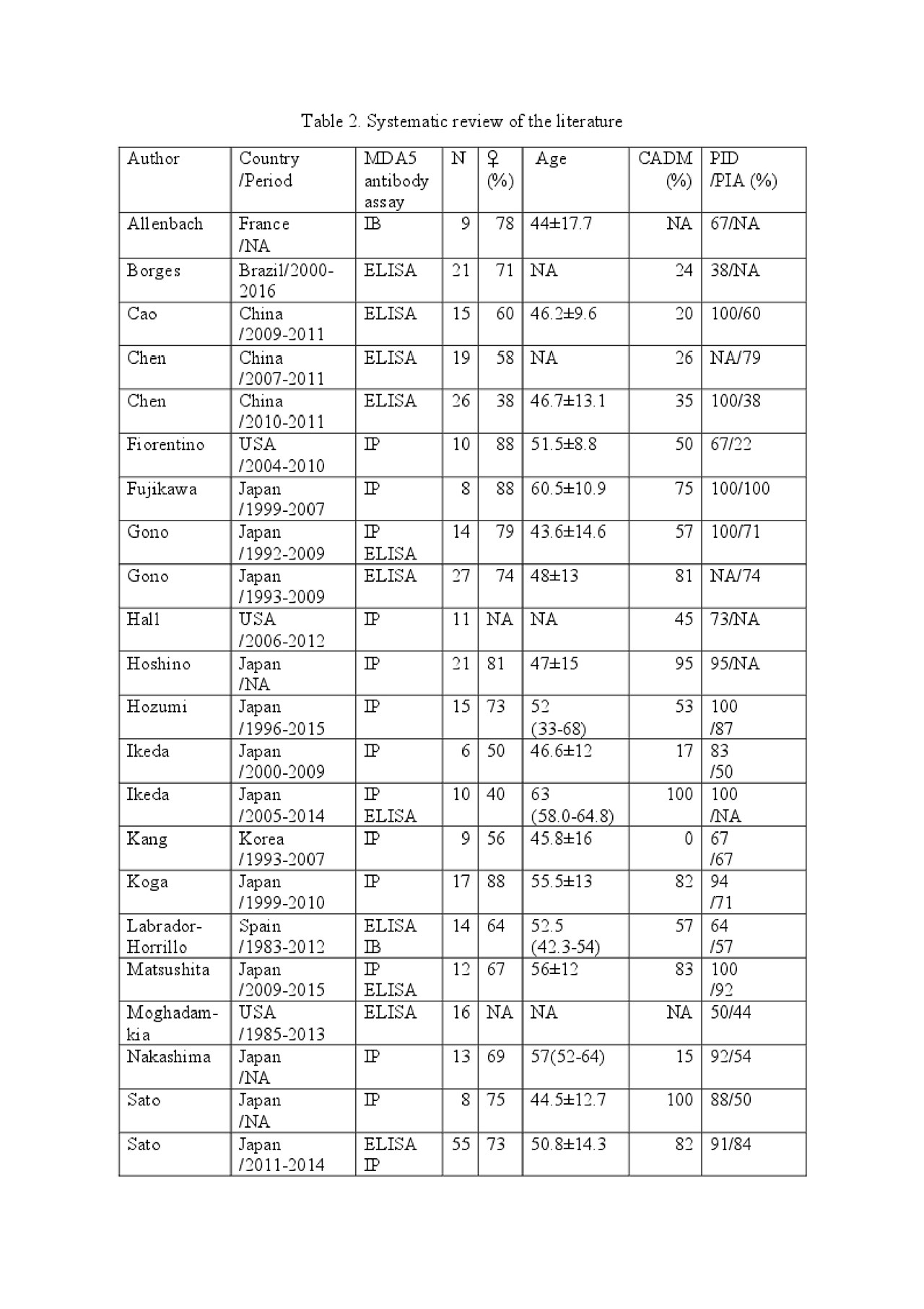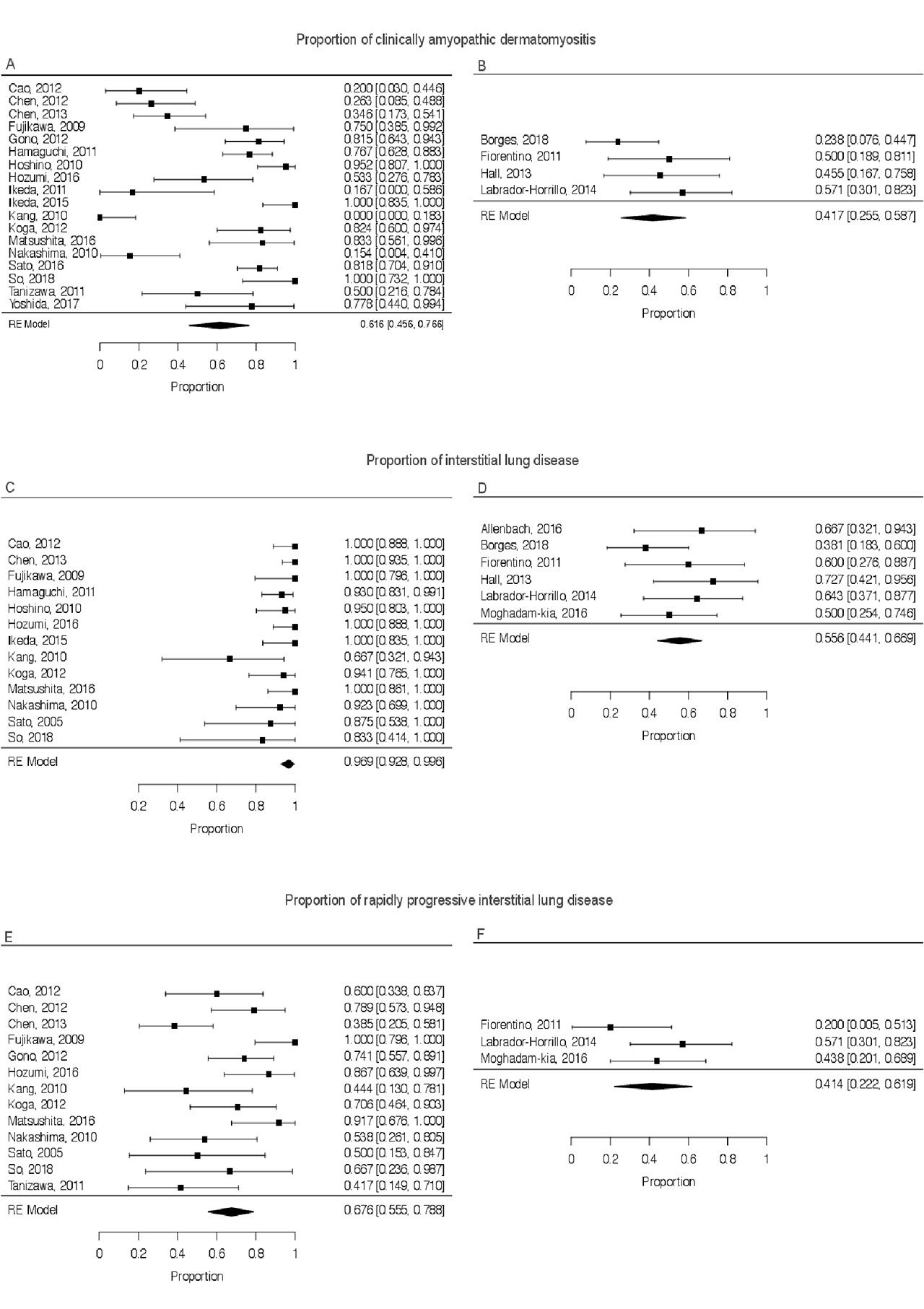Session Information
Session Type: Poster Session (Sunday)
Session Time: 9:00AM-11:00AM
Background/Purpose:
Anti-MDA5 dermatomyositis is characterized by little or no muscle involvement, distinct cutaneous features and an increased risk of severe interstitial lung disease (ILD) with high mortality. We aim to describe clinical presentation, radiological features and disease course in 6 patients and to perform a systematic review and meta-analysis of the literature on proportions of clinically-amyopathic form and ILD/rapidly progressive ILD (RPILD) in anti-MDA5 dermatomyositis according to the ethnicity of the published cohorts.
Methods:
A total of six patients fulfilling diagnostic criteria of dermatomyositis with MDA5 antibodies, followed between 2014 and 2018 at the Department of Internal Medicine of Lille University Hospital and Roubaix Hospital, were retrospectively reviewed.
For the systematic review, we searched MEDLINE up to May 2019 for cohorts describing clinical and radiological features in dermatomyositis with MDA5 antibodies, using the following search terms (dermatomyositis OR interstitial lung disease) AND (MDA-5 OR (melanoma differentiation-associated protein 5) OR anti-CADM-140) AND English [language]. We calculated weighted pooled summary estimates of proportions of clinically amyopathic dermatomyositis, ILD and RPILD. For each meta-analysis, we used the DerSimonian and Laird method. A random-effects model was used to combine data. The overall effect was estimated using a weighted average of individual effects, with weights inversely proportional to variance in observed effects.
Results:
In our case series, median age at diagnosis was 54.4 years (39.3-55.4). There were four women. Five patients had clinically amyopathic dermatomyositis. Three patients had a characteristic cutaneous phenotype consisting of skin ulcerations and palmar papules (Figure 1 A, B). Among five patients with ILD, one patient had a rapidly progressive course leading to respiratory failure (Figure 1 C) one week after admission, three patients had a severe ILD and received pulsed methylprednisolone and intravenous cyclophosphamide. Among these three patients, add-on immunosuppressant therapy with rituximab was given in one case, mycophenolate mofetil in another, and plasma exchange with intravenous immunoglobulin in the last case.
A total of 25 studies (Table 2), consisting of 19 Asian cohorts and 6 American/European cohorts were included in the meta-analysis. Pooled proportion of clinically amyopathic dermatomyositis was 61.6% [95% CI 45.6%-76.6%] in Asian cohorts and 41.7% [25.5%-58.7%] in American/European cohorts (Figure 2). Pooled proportion of ILD was 96.9% [92.8%-99.6%] in Asian cohorts and 55.6% [44.1%-66.9%] in American/European cohorts. Pooled proportion of RPILD was 67.6% [55.5%-78.8%] in Asian cohorts and 41.4% [22.2%-61.9%] in American/European cohorts.
Conclusion:
Our results show higher proportions of clinically amyopathic dermatomyositis and ILD/RPILD in Asian cohorts than in American/European cohorts.
To cite this abstract in AMA style:
Pokeerbux M, Dauchet L, Lopez B, Maillard H, Morell-Dubois S, Auxenfants E, Hachulla E. Anti-MDA5 Dermatomyositis: A Case Series, Systematic Review and Meta-analysis of the Literature [abstract]. Arthritis Rheumatol. 2019; 71 (suppl 10). https://acrabstracts.org/abstract/anti-mda5-dermatomyositis-a-case-series-systematic-review-and-meta-analysis-of-the-literature/. Accessed .« Back to 2019 ACR/ARP Annual Meeting
ACR Meeting Abstracts - https://acrabstracts.org/abstract/anti-mda5-dermatomyositis-a-case-series-systematic-review-and-meta-analysis-of-the-literature/



